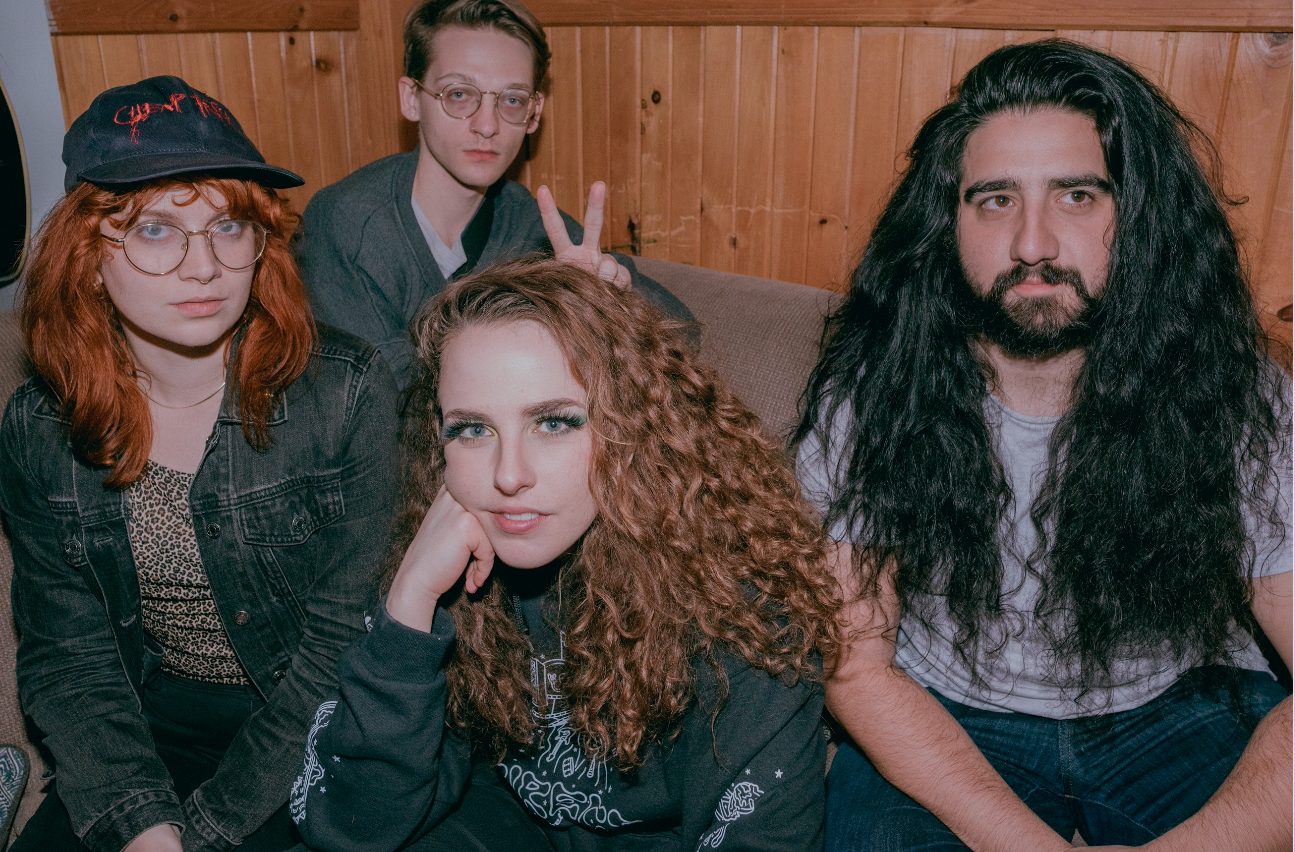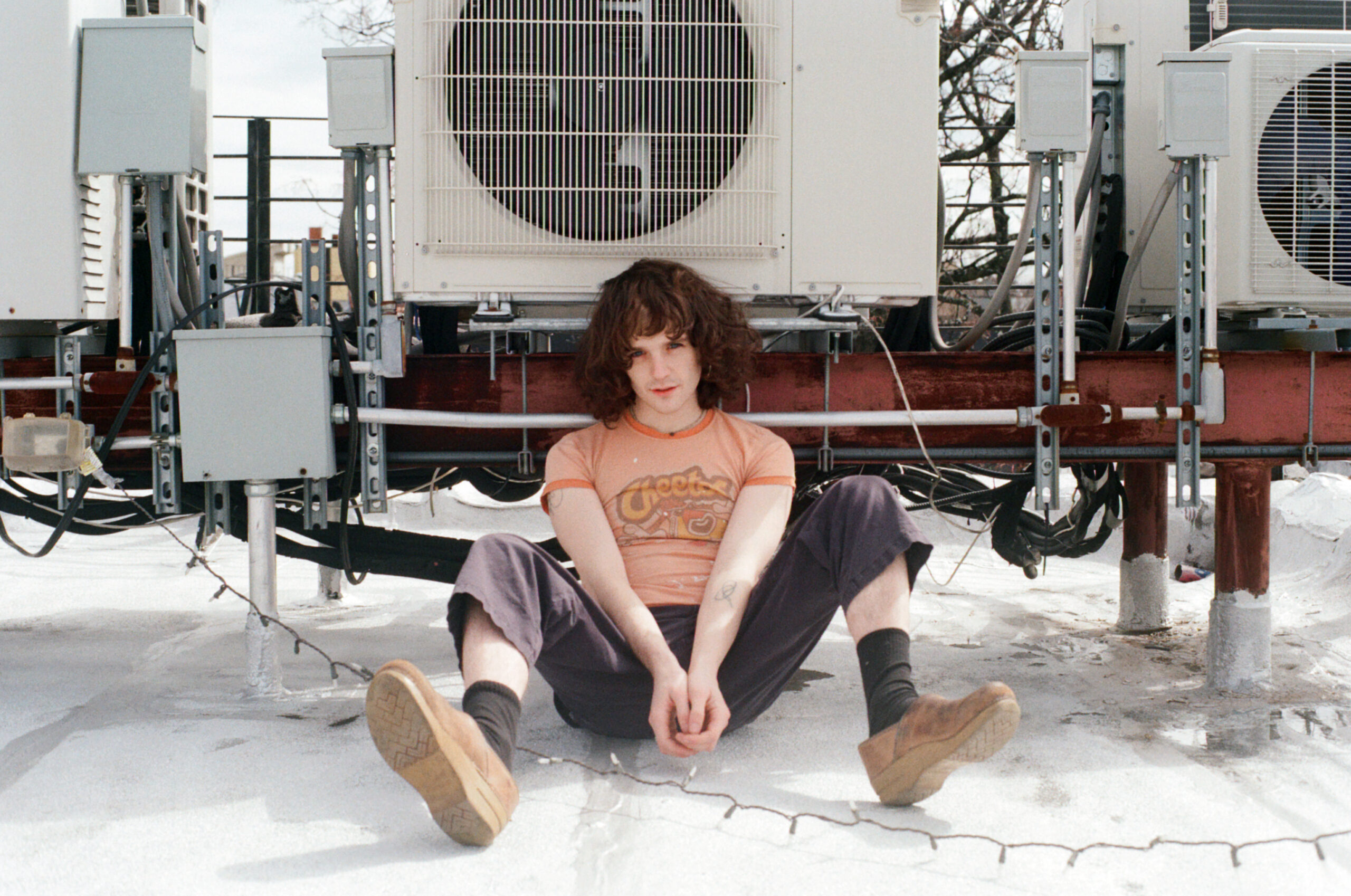There was no precedent for a band's sophomore comeback after a DIY debut hailed by Hayley Williams, but Florida emo quartet Pool Kids didn't cow to the pressure. After the pop-punk superstar declared on Instagram that 2018's Music To Practice Safe Sex To is what Paramore "wished we sounded like in the early 2000s," Pool Kids doubled down. LP2, out July 22 on Skeletal Lightning, pulls from influences as disparate as Pink Floyd to Rina Sawayama and is self-titled: "A big dick move," lead singer and guitarist Christine Goodwyne says, flipping her Robert Plant curls. "It's confident, it's sexy," adds bassist Nicolette Alvarez, grinning in a plaid skirt and jean jacket. (Onstage, Alvarez animates the school-uniform-punk shtick with a plucky sneer.) Guitarist Andy Anaya, who made a name for himself with Orlando's You Blew It!, and drummer Caden Clinton agree. "It's like, We're here," Anaya says.
Beyond great hair and a cult following in the fabled domain known to some as Emo Twitter, the band has endorsements from the multigenre rock veterans who've taken them on tour — the Wonder Years, Mom Jeans, Into It. Over It., and later this year, the Mountain Goats ("they make really lovely music," John Darnielle texts me excitedly). On March 13, 2020, Pool Kids were on the road with the Wonder Years when they were sent home from St. Louis. The industry, every industry, seemed to hold its breath. Their first show back, after almost two years, was a raucous slot at Fest, the annual Halloween-time punk festival in Gainesville — not quite a hometown show, but only a few hours from Tallahassee, where they all met. Goodwyne and Alvarez, who have since relocated to Chicago, were programmers at a local radio station. Alvarez calls Florida a "complicated place." Clinton, who's performing this year with Tallahassee compatriot Ethel Cain, thinks the isolated geography makes bands (who can survive it) better. "You're forced to tour, you're forced to get out," he says, in wire-rims and a black Vegas-style silk dragon shirt.
Upon forming in 2017, before they could afford a van — or knew how to navigate life on the road with any savvy — they spent the first year-and-change touring in two cars on school breaks, driving through the night and sleeping in gas stations. "We didn't know what the fuck we were doing," Goodwyne says. They had one demo on Bandcamp, and only two more burnt to CDs, which they gave away for free. "But we were just crazy enough to figure it out," adds Alvarez. Even though they were barely breaking even, they'd already begun setting aside funds for what would ultimately become Pool Kids. For the last four years, they would allocate portions of their earnings toward future studio time and music videos rather than paying themselves out. (Goodwyne went skydiving for "Arm's Length," out today and directed by Dan Watt; lead single "That's Physics, Baby" chronicled a Wes Andersonian wilderness quest.)
Self-titled was their ark. "It gave us a purpose to live," Goodwyne says, and the band echoes her without a second's hesitation. After years of hustling for gigs, followed by a pandemic, things only got harder. A month before their first official rehearsal for Pool Kids, Clinton's mother died in an accident. "We asked him if we needed to call it off, but he told us no," Goodwyne recalls, "he had to do it for her." They loaded everything they had into 12 prismatic, tenacious hits, whose enormity reveals itself in the band's towering dynamics: meticulous builds, intricate breakdowns, and Goodwyne's soaring range.
"We were like, Fuck it, try that crazy thing. Why not let Caden play trash cans and drag a Bird Scooter in?" Alvarez recalls. "We'll try anything once if it means it's going to yield something really fucking cool." They even interpolated captured audio from the power-on sound of Clinton's handycam; Alvarez, whose background is in jazz, also tracked keys and theremin. Early in the process, Clinton set a galvanizing standard: They should write songs meant for stadiums. After the Hayley Williams plaudit, it occurred to him they might not be playing basements for much longer.
Goodwyne explains that while it is "kind of a breakup record," Pool Kids doesn't follow a linear narrative as much as an impressionistic one. "It's how life actually goes," she says. "You're back and forth between feelings and ideas. There are songs that have nothing to do with the breakup, just like how random things take your mind off it for a minute, and then all of a sudden you're right back." What's more is that, like any writer deft with verisimilitude and pathos, she's interested in sensationalizing for potency. She triangulates the more nuanced, messy emotions, tugging a memory in an angrier direction to see what tenderness emerges on the other side.
The cinematic opener, "Conscious Uncoupling," sees her leaving the overgrown, shotgun house where she lived with her ex, bidding farewell to his mom, his voice, and "the stupid look" on his face, intensifying in vitriol and volume with every measure. But by the end, she equivocates. "You still have time to take it back," she sings, her voice soft and pleading. Goodwyne doesn't consider herself to be an angry person, but she acknowledges that exaggerated angst imbues her writing with power. "Even if a song starts out totally calm, it'll end up like, 'HERE I AM ON THIS STUPID COUCH AGAIN!'" she whisper-yells, quoting the refrain. Coming from his background shredding in hardcore and metalcore bands, Anaya adds that he finds it "healthy to release negative emotions by playing ferociously."
Nearly five minutes long, indie earworm "Talk Too Much" is an epic diss track skewering the type of neo-demagogue whose soapbox is social media, and features one of the cleverest lines on the record: "Learning how to ignore you/ And people like you… 'cause people like you, they know how to get what they want." The repetition folds and unfolds around the meanings of "like" like an origami rabbit-duck — first an accusation, then a begrudging concession. Goodwyne's dexterity with craft extends past wordplay to the macro level. "We tried to map it," she recalls when I point out the song's complex structure, "and it's like… 'chorus,' 'intro'? And then at one point, 'down quiet chorus?' And then it's like '...bridge?' 'Second-ending-chorus-thing?'"

The album's transitions throughout are vigorous and surprising, oscillating between heavy climaxes and hushed confessions. Sometimes Clinton pounds a kickdrum in properly metal double-time — a genre he and Anaya gravitate toward. Elsewhere percussion drops out entirely, as on slinky "Almost Always Better (Almost Always Worse)," whose villainous pre-chorus is coupled with mechanized squeaks and bleeps ("the R2D2 sounds," according to Goodwyne) before sliding into watery keys, as though the robot has been washed away by a wave, nature winning out over artifice. "Do you hear that?" Goodwyne croons, inviting the listener to pay closer attention to the fissures in her armor. It's one of the defining properties of Pool Kids — balancing mathy, hypertechnical geometry with the pain that makes us human.
"We don't want to be just-a-math-rock-band that only other musicians like. Instead of asking, How can I make this more technical? now I'm just trying to ask myself, How can I make this more catchy?" she explains. "I'm less concerned about proving myself as a 'woman guitarist.' I've proved myself enough." Now, she wants to make music that lingers with people, whose melodies repeat in their heads, move them at live shows. There's a moment on "Swallow" — a vocoder-rinsed pop-goth ballad whose serpentine guitar riff snakes around her disaffected quips — when the time signature shifts from 7/4 to 4/4. Here, instrumental virtuosity makes the song more inviting, not less. Uniquely, the band's accessibility proceeds from their talent.
The experimentation that distinguishes Pool Kids wouldn't have been possible without the band's intimate trust in one another — a familial bond that proved in the end not only helpful, but necessary. After everything they had already endured, their very last week of recording, a new calamity struck. They'd finished most of the tracking in Seattle and had traveled to Portland for "the homestretch," fixing verses that weren't quite working, adding playful ornamentation. Their first day at the new space was an auspicious success. They stayed up past 2AM working on the devastating closer, "Pathetic," and could finally get some sleep.
A few hours later, the assistant producer woke them up in a frenzy. The studio was flooding. Inches of water buried their gear still plugged into power boxes, Goodwyne's pedalboard, Clinton's drumset. (Miraculously, Anaya's amp survived — "the tone's just a little bit more moist," he jokes.) The album itself, on a hard drive, was rescued from the floor by sheer chance. In spite of everything they lost, they found ways to create with the tragedy. "Pathetic," which they finished in its wake, samples iPhone footage of the flood. "What can we make of it? What can we make of this?" Goodwyne sings in the album's final moments, before the evidence of their triumph—the answer—resounds over the reverb.
Pool Kids is out 7/22 on Skeletal Lightning. Pre-order it here.
We rely on reader subscriptions to deliver articles like the one you're reading. Become a member and help support independent media!






